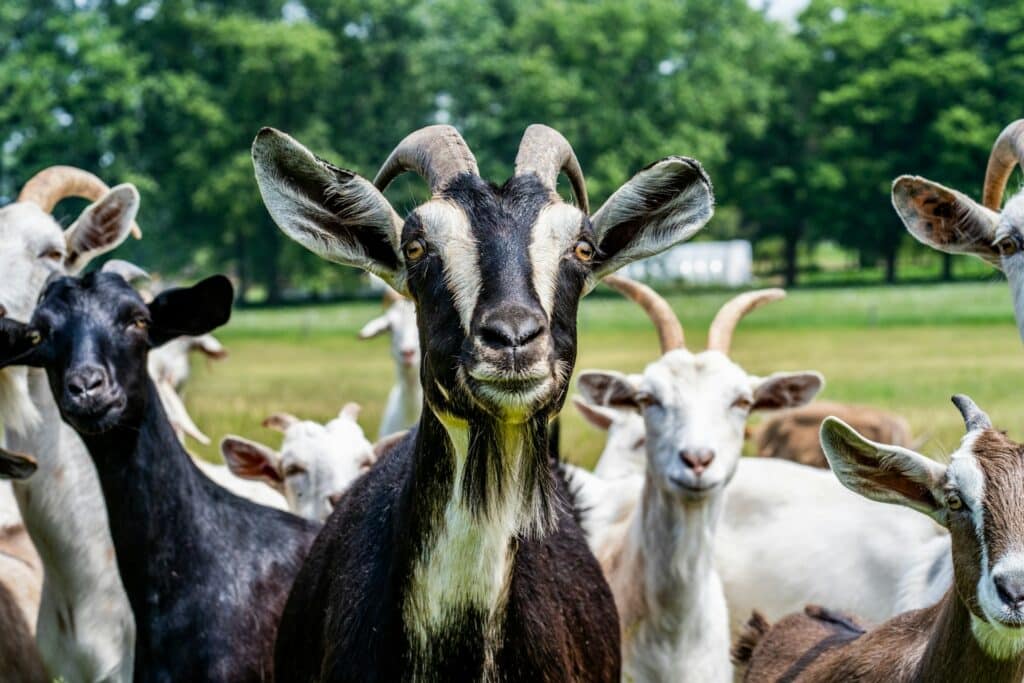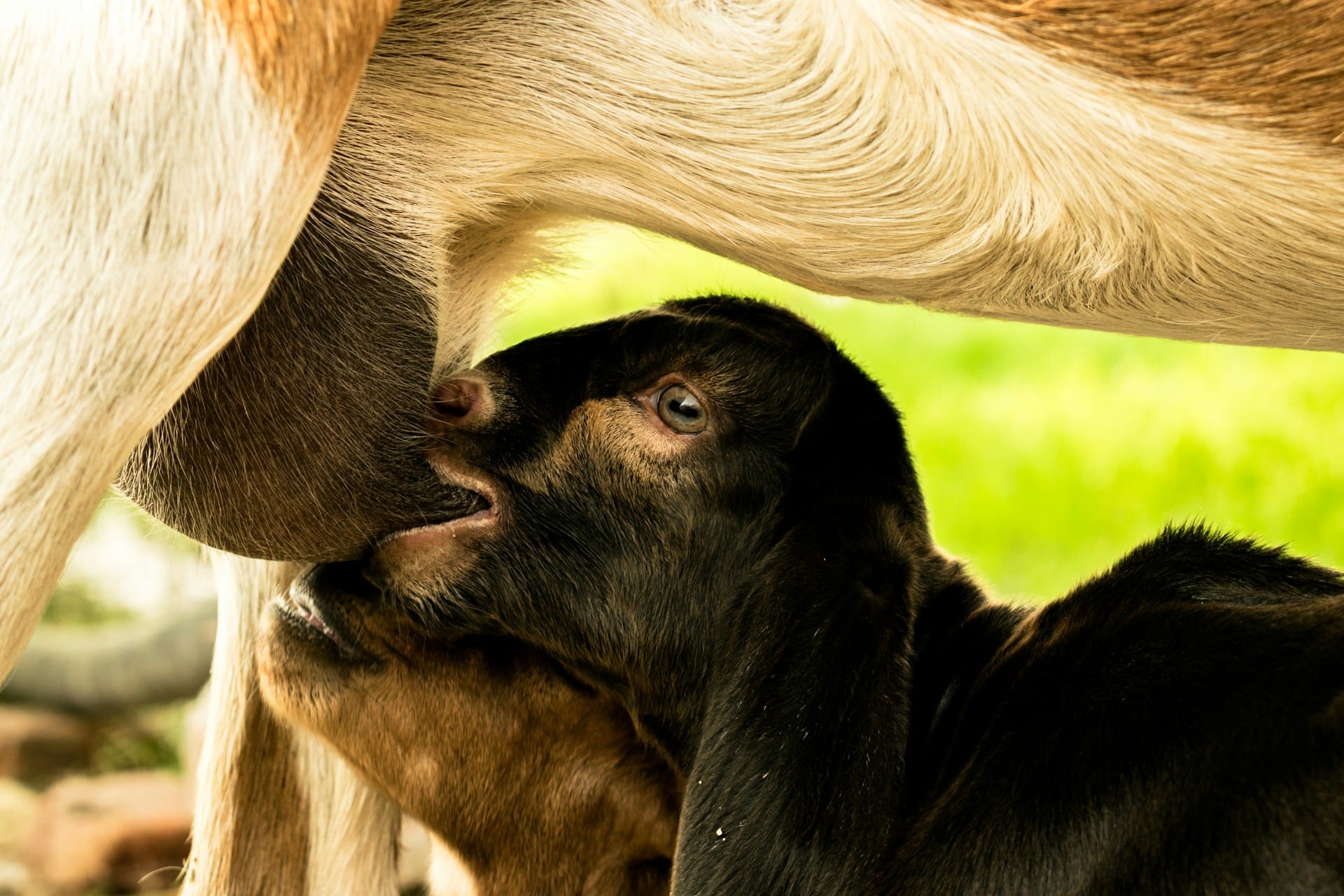Every morning at Camp One we take the long walk to the goat paddock.
We’ve got a bucket of grass pellets, some kibble for the dog, and a couple bottles of warmed milk for the goat kids. It’s cool outside, alive with creek-burble and birdsong. It’s hard to get up, but there is rarely a morning outside that our bleary mindfog does not give way to invigorated gratitude.
The animals do not immediately see us coming. They are quiet, and if we don’t snap a twig along the way we might even see the younger goats huddled together, settled onto their haunches and chewing their cud. The older goats will be found pacing slowly, nibbling what’s left of the dewy grass as our dog patrols the fenceline.
This bucolic scene changes once we’ve been spotted. It might be a bleat or a woof depending on who sees us first, but once the word is out it spreads like wildfire.
Our dog and the younger goats charge the gate. The older goats jog back and forth, their collar bells all atankle. Unable to contain their excitement, some will rise up against others in head-butting dominance displays as if to make sure that everyone knows who’s got first dibs.
The Frenzy

As we get closer to the gate, our Anatolian shepherd, AD, will start to chase off any animals that might be crowding our entry. He means well, but is often violently enthusiastic in the execution of his crowd control duties, mouthing the neck of the alpha doe, tugging at her collar, and dragging her all over the place. But it works and we slip into the paddock.
We’re immediately surrounded by a bleating frenzy of hungry goats, all jostling for position as we dump the feed across several containers. It’s not uncommon for an animal to put us off balance or even to rear up and knock the bucket right out of our hands. But something amazing happens once all the feed has been distributed.
Everything goes quiet again.
Each animal finds a spot. There is only the contented munching of compressed Timothy grass and alfalfa pellets punctuated by the scrape and crunch of AD nosing his bowl of kibble. All is well, at least for a few moments.
Desire and Probability
As the food disappears into their gullets, a sense of scarcity develops. The dominant goats once again assert themselves with a clacking of horns and there is some rushing about as subordinates squabble for any remaining dust. Watching and listening, we think about how we manage our own needs.
There is a certain restlessness that attends desire. And if it feels to us that our wants are just within our grasp, or perhaps slipping away from it, then we might feel this even more acutely.
The idea of having a brand new house in an impossibly beautiful location is the passive stuff of fantasy for many of us. We don’t lose sleep over the matter. But how would it feel if a rich uncle suddenly passes and we inherit the means to procure our dreams? And then what if we find that house in that place, only to learn that there are ten other people bidding on the same property? Under those circumstances, we may not sleep at all.

It seems to us that the intensity of our desire is linked to our perceived probability of attainment.
The goats are hungry before they see us. But they are also quiet, relaxed, and seemingly content. It is not until they sense the possibility of food that they lose their minds. Perhaps this offers insight into the tropes of the miserable rich and the jovial poor.
Want Nothing
We are all familiar with the stories of people who seem to have it all: beauty, wealth, talent, and notoriety. And we know how their parable tragically ends: drug abuse, debauchery, and even suicide. If our goats are to be trusted, maybe it’s because everything they ever wanted was now immediately attainable and far from palliating their desire, like the rattle of the feed bucket, everything was made so much more intense. Modest satisfaction gives way to frenzied acquisition and if there is any truth to this, the restlessness of their unquenchable longing might understandably warrant self-medication.
And as they dose themselves into oblivion, some barefoot wretch in third-world squalor is banging on a rusty oil drum and singing about nothing to nobody because he cannot contain his joy. And while he wants all the things that people want, he’s never had a real shot at any of it, and this is not the tragedy we imagine.

His contentment is a byproduct of his resignation. Through the latter, he is blind to possibilities beyond the very moment that he is in. This is the placid cud-chewing of the hungry goat, where the desire for food is forgotten in the warmth of the flock.
For many of us, this is the unmet need behind all desire: connection and community.
Every beast must have its share of the essentials: food, water, and shelter. But only a bit of each. More is not better, and worse than more is the prospect of it.
Regarding food, the prophet said, may God’s peace and blessings be upon him:
Mouthfuls sufficient to keep his back straight are enough for the son of Adam.
Tirmidhi
Good Company
In the company of others similarly resigned to privation, we will not likely want more than necessary. Muslims who observe Ramadan will testify to this, and to the comparative difficulty of trying to fast on one’s own.
What is missed, however, is the way in which we willingly depart from, or dismiss the importance of our connection to the people of resignation. We instead invest in the illusion of attainment, and suffer the consequences of a hunger unleashed. We do this every time we pick up our phones and scroll through our social media feeds.
It’s all right there, at our very fingertips.

Delicious food, tropical getaways, the teasing smiles and gyrations of the young and the beautiful. We lose our minds at the possibilities! We want all of it, more of it, an endless supply of it!
What’s more, all of it is promised to us. We only need to buy this product or register for that course or attend the other event, “Do what we do and you’ll have what we have.”
This is their message and it’s so powerful because it’s true.
This is where discretion matters. What do they actually have and is that something we really want?
The Believer’s Template
We are believers, Muslims, a people with a revealed book and moral precepts and more than 1400 years of learned, dynamic discussion. We have a template. We have a measure. We are equipped to screen all the offers before us and to make the decisions that will put us right.
Better still is to remain ignorant of their offers. Like the goats before they saw the bucket, we lie comfortably amongst one another, resigned to the moment that we are all in, appreciating that there is nothing for us beyond what God has decreed.
Surely in the remembrance of God do hearts find comfort.
Q13:28
Leave a comment below for posterity or join us in the D&T Chautaqua Discord to discuss this post with other adventurous spirits from around the world.
